7 start with P start with P
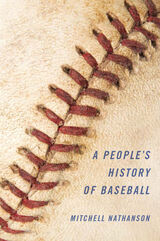

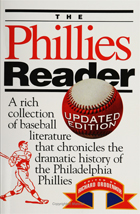
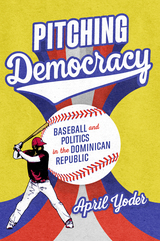
How Dominicans contribute to Major League Baseball and what they receive in return.
From Juan Marichal and Pedro Martínez to Albert Pujols and Juan Soto, Dominicans have long been among Major League Baseball’s best. How did this small Caribbean nation become a hothouse of baseball talent? To many fans, the answer is both obvious and disconcerting: pro teams use their riches to develop talent abroad, creating opportunities for superhuman athletes and corrupt officials, while the rest of the population sees little benefit.
Yet this interpretation of history is incomplete. April Yoder traces how baseball has empowered Dominicans in their struggles for democracy and social justice. While the dictatorship of Rafael Trujillo saw the sport as a means of cementing its power at home and abroad, the Dominican people fashioned an emancipated civic sphere by seeing their potential for democratic success in their compatriots’ baseball success. Later, Dominicans articulated demands for democracy, economic opportunity, and civil rights through successful calls for public support of amateur and professional baseball. Today, Dominicans continue to demand that incentives for the baseball industry foster human as well as economic development. A revelatory and innovative history, Pitching Democracy restores agency to the Dominican people and honors their true love of the game.
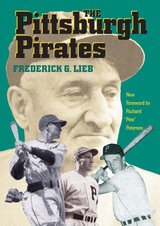
An admirer of Pirate president Barney Dreyfuss, prolific baseball writer Frederick G. Lieb consorted with the club’s biggest stars, christened the legendary Dreyfuss “the first-division man,” and produced The Pittsburgh Pirates, one of the fifteen celebrated histories of major league teams commissioned by G. P. Putnam’s Sons in the 1940s and 1950s. Originally published in 1948, Lieb’s history ranges from the ball club’s earliest professional days in the late nineteenth century as the Pittsburgh Alleghenies to its spring training session in preparation for the 1948 season, a span that included six National League pennants and two World Series championships, as well as a loss to the Boston Red Sox, then the Pilgrims, at the inaugural World Series a century ago.
“This reprint of Fred Lieb’s The Pittsburgh Pirates is an invitation for baseball readers to enjoy Lieb’s wonderful stories of the great Pirate teams of the first half of the twentieth century,” writes Richard “Pete” Peterson in the new foreword to this edition. “Lieb’s book is rich with accounts of World Series triumphs and disappointments, of epic encounters on the playing field, like that between Wagner and Cobb, of mutinies in the clubhouse, of courageous comebacks, and of devastating defeats, including the infamous ‘homer in the gloaming.’”
In Lieb’s personable and anecdotal prose, honed over the course of his sustained sportswriting career, the book conveys “baseball drama of the highest order,” including the pre-Dreyfuss days of Captain Kerr, Ned Hanlon, and Connie Mack; Dreyfuss’s dynasty in the early twentieth century; the dramatic World Series triumphs of 1909 and 1925; the end of the Dreyfuss era and the sale of the club to a syndicate headed by John Galbreath and Bing Crosby; and the purchase of Hank Greenberg and the emergence of slugger Ralph Kiner. Aided by twenty-five black-and-white photographs, this rare history revisits the glories and stories of “fabulous old Pirates” such as Honus Wagner, Tommy Leach, Fred Clarke, Babe Adams, Max Carey, Kiki Cuyler, Pie Traynor, Paul and Lloyd Waner, and Arky Vaughan.
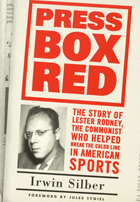

It happens every summer: packs of beer-bellied men with gloves and aluminum bats, putting their middle-aged bodies to the test on the softball diamond. For some, this yearly ritual is driven by a simple desire to enjoy a good ballgame; for others, it’s a way to forge friendships—and rivalries. But for one short, wild-haired, bespectacled professor, playing softball in New York’s Central Park means a whole lot more. It's one last chance to heal the nagging wounds of Little League trauma before the rust of decline and the relentless responsibilities of fatherhood set in.
Professor Baseball is the coming-of-middle-age story of New York University professor and Little League benchwarmer Edwin Amenta. As rookie manager of the Performing Arts Softball League’s doormat Sharkeys, he reverses softball’s usual brawn-over-brains formula. He coaxes his skeptical teammates to follow his sabermetric and sociological approach, based equally on Bill James and Max Weber, which in the heady days of early success he dubs “Eddy Ball.” But Amenta soon learns that his teammates’ attachments to favorite positions and time-honored (if ineffective) strategies are hard to break—especially when the team begins losing. And though he rejects the baseball-as-life metaphor, life keeps intruding on his softball season. Amenta here comes to grips with the humiliation of assisted reproduction, suffers mysterious ailments, and finds himself lingering at the sponsor’s bar, while his partner, a beautiful but baseball-challenged professor, second-guesses his book in the making. Can he turn his team—and his life—around?
Packed with colorful personalities, dramatic games, and the bustle of New York life, Professor Baseball will charm anyone who has ever root, root, rooted for the underdog.
READERS
Browse our collection.
PUBLISHERS
See BiblioVault's publisher services.
STUDENT SERVICES
Files for college accessibility offices.
UChicago Accessibility Resources
home | accessibility | search | about | contact us
BiblioVault ® 2001 - 2025
The University of Chicago Press









